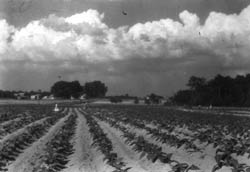 |
|||||||||
Tobacco, History, and Memory: Storytelling and Cultural Grieving in Eastern North Carolina
The community where our historians listened for a change is at a crossroads both literally and figuratively. On the border of Johnston and Harnett counties, Bailey's Crossroads seems to be in the middle of nowhere - tobacco and sweet potato fields, a couple of modest churches, a handful of houses. Yet like many other rural communities in eastern North Carolina, Bailey's Crossroads finds itself at the center of national and international policy debates about immigration, the tobacco industry, the decline of small family farms, and the globalization of corporate agriculture. In their interviews with farmers, farm workers, clergy, teachers, and other local residents, SOHP historians documented changes in how farmers have cultivated, harvested, cured, and sold tobacco during the past four decades. In the process, they also explored changes in tobacco culture and politics, as well as the transformation of work, family, and community life. The focal point for our interviews turned out to be Ebenezer Baptist Church in Bailey's Crossroads, where Rev. Warren Bock, the church's pastor for the last fifteen years, has been extremely active in farm labor and other rural issues. As part of the community outreach component of "Listening for a Change," We taught a Sunday school class at Ebenezer in the fall of 1999 during which tobacco farmers discussed the impact of the changing economy on their church community. In February 1999, we led a forum that suggested oral history's potential for helping members of tobacco communities come to terms with such change. The program was held at a museum in the Pitt County town of Farmville, where college students and townspeople crowded into the room to listen as we conducted life history interviews with three tobacco farmers. |
|||||||||
The Southern Oral History Program Center for the Study of the American South Love House and Hutchins Forum 410 East Franklin St., CB# 9127, UNC-CH Chapel Hill, NC 27599-9127 (919) 962-0455 info@sohp.org | |||||||||
